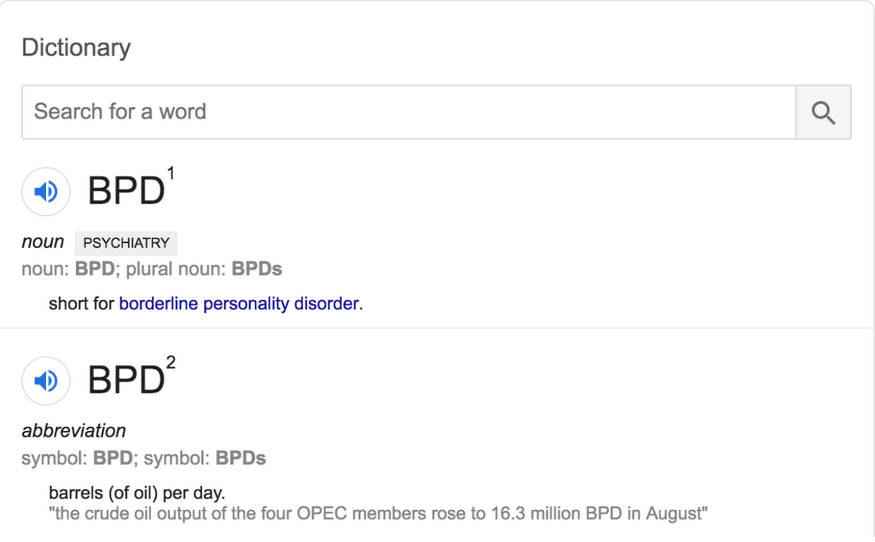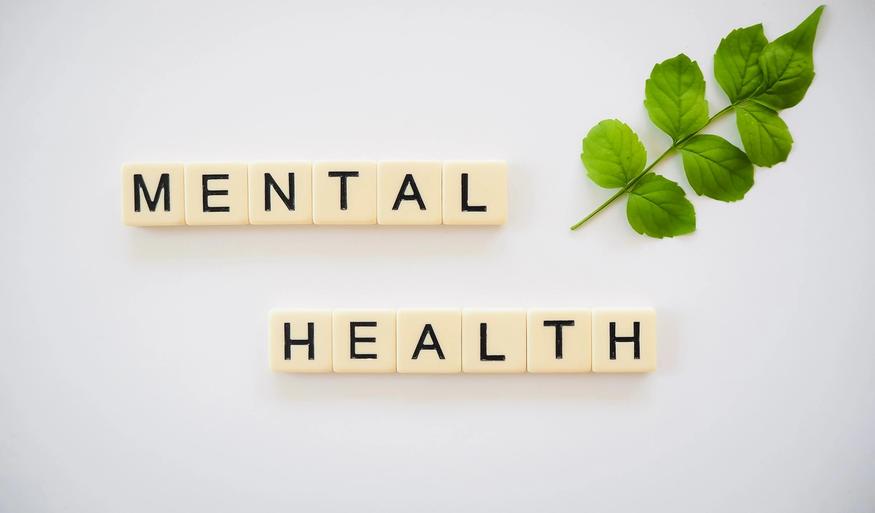A Brief Introduction to Borderline Personality Disorder
Published on 1/30/2020On this blog, you’ll find a lot of discussion regarding Borderline Personality Disorder, also commonly referred to as simply BPD - as in the age of LOL and BRB are we really going to spell it out entirely? Therefore, it seemed wise to have a little intro to the disorder.. If you haven’t heard of it, that’s quite normal given that personality disorders are currently less discussed than other forms of mental illness and are still a highly controversial area of mental health. For the purpose of displaying it accurately, I’ll aim to describe the disorder as it can appear for a variety of individuals, instead of focusing solely on my experiences. However if I do include that, as perhaps a reference point or way to depict certain areas of it, I will highlight that to show that this is merely my personal reality of BPD and not a generalization to all individuals with BPD.
First, let’s begin with the dictionary definition of Borderline Personality Disorder.

Ah, incredibly insightful. Now we’ll focus on the most relevant form of BPD, so Shell employees you may prefer a different article focusing on your favourite BPD.
What is BPD?
Borderline Personality Disorder is a mental health disorder that disturbs the way you think and feel, both about yourself and others. It is classified as a disorder as it causes issues in your functioning in everyday life. These issues are of your self-image and awareness, difficulty managing your emotions and behaviour as well as a pattern of unstable relationships - and not just romantic ones! A big aspect of BPD is an intense fear of abandonment with difficulty being alone. It can present itself in inappropriate anger, mood swings and impulsivity that pushes those around you away, despite the deep desire to have loving relationships.
What are the symptoms of BPD?
There are 9 primary symptoms of Borderline Personality Disorder. These are used for the diagnosis of BPD, and the treatment following it.
1. An intense fear of abandonment. This will involve the BPD individual going to extreme measures to avoid real or imagined rejection, or even just a temporary separation. This can be triggered from something as menial as a loved one going away for the weekend or arriving late from work, with the resulting actions involving clinging, begging, fighting, obsessive tracking and more.
2. A pattern of unstable relationships. Not a huge surprise when you’re with someone described as the above. But this transcends that, as people with BPD tend to fall in love quickly and fall out of love just as quick. They meet someone and believe this individual will be the one to save them, to make them feel whole. All relationships are categorized as perfect or horrible, each individual is idolized or demonized, there is no middle ground. Think of it as people with BPD living in black and white, instead of the wonderful technicolour of real life.
3. An unclear and shifting self-image. BPD accompanies an extremely unstable sense of self, struggling with your feelings towards yourself. You don’t have a clear idea of who you are and what you want in life, leading many to frequently change friends, jobs, lovers and more. This can also manifest as dissociation, and not seeing yourself as if you even exist.
4. Impulsive and/or self-destructive behaviours. This is one of the traits that really sets BPD apart from the myriad of mental health illnesses it has similarities with. These risky behaviours can include, but are not limited to, binge eating, shoplifting, spending recklessly, binge drinking, drug abuse and lots of sex - frequently unprotected!
5. Self-harm. This can be quite a difficult topic to discuss, and more for those surrounding the BPD individual than themselves. For BPD, this symptom can range from self-harm with no suicidal intent to attempts on your own life. These behaviours can be a coping mechanism, linked to the low self-worth as a form of punishment or just a way to try and control the flood of emotions we constantly experience.
6. Mood swings. Speaking of a flood of emotions, BPD often involves wide mood swings ranging from a few hours to a few days, which can have it misconstrued for Bipolar Disorder. They differ from depression and BD in that they pass quicker, which can also mean they are brushed off by many. It’s like when you were a teenager and would be extremely moody, or on your period when you cry randomly, except that we have this almost everyday without the physical and understandable cause.
7. Ongoing feelings of emptiness. Individuals with BPD often feel extremely empty, depicting it as a void or hole within them. It can make them feel like they’re nothing and worthless. This can really link to the impulsive behaviours, as they may use drugs, food or sex to try and fill the void without success. This shows the cyclical nature of Borderline Personality Disorder symptoms and how they are interwoven - making them even trickier to treat.
8. Extreme anger. A lot of people with BPD struggle with intense anger and a short temper, and especially with controlling it once it hits. They can be consumed with rage, and resort to throwing things, yelling, hitting things or even people. However, this anger is not always directed outwards, a lot of it is towards themselves and can lead to the self-harm mentioned earlier.
9. Loss of contact with reality. Dissociative feelings can occur for the BPD individual, and can have them lose touch with reality and with their own body. They feel foggy, and spaced out. This can also involve paranoia, and suspicious thoughts about others’ motives, feeling like everyone is out to get them.

BPD and its Friends
Borderline Personality Disorder is usually diagnosed late, and rarely diagnosed on its own, and often accompanies other disorders. Common disorders that occur alongside it are:
- Depression
- Bipolar Disorder
- Substance Abuse
- Anxiety Disorders
- Eating Disorders
This is one of the hardest parts of BPD, as it gets mistaken for other disorders or people struggle to understand which symptoms are BPD and which are a disorder alongside it. Are the depressed intervals part of BPD mood swings or indicative of a Depression diagnosis? Is the starvation due to anorexia or a form of self-harm? Does it really matter either way?
To help myself comprehend this, I like to think of a tree. You are the tree - I promise this isn’t going to be too spiritual! Above the ground the tree looks fine, healthy, functioning. Beneath the ground (and within the individual’s mind) the roots may be damaged, and rotting, but no one knows from simply looking at them. These ill roots are woven around each other, tangled into a diseased mess. Each root is a different symptom, but they’re so inexplicably linked that you cannot separate them clearly.
For me, I struggled many years with an eating disorder, yet struggle to understand if it was merely a symptom of my depression or ultimately, my BPD. Were the acts I inflicted upon myselfanother form of self-harm, a release for my self-hatred? I can never really know, as whatever the cause, the result was the same. And whatever the cause, it still needs to be addressed in its own right and treated with importance. You could look at almost all BPD symptoms in this manner, their roots firmly gripped in getting attention, self-punishment, low self-worth and the need to regain control. And by ‘getting attention’, it does not intend to reduce the experience or struggle but is a vital aspect to the disorder to observe.

Why do people get BPD?
Wouldn’t it be so easy if we knew? Imagine if we could tell parents that if they don’t ever mention the word calories, their child wouldn’t get an eating disorder. Or to tell them “I love you” once a day and avoid a screwed up BPD daughter. It’s not that simple, it never is. In Psychology we often discuss nature vs. nurture. What is the result of our nature (brain formation, genes, hormones) and what part is nurture (parenting influence, education, friends). One of the first things I was told regarding BPD is that it is both, it is someone's predisposition reacting badly with their environment. And it might be an environment that isn’t harmful to others, but due to the specific way we were constructed or interacted with said environment, we ended up like this.
It’s hard to pinpoint why some and not others. I grew up with two sisters, who I’m often told I am so similar to. And they’ve had their personal share of struggles, their speed bumps on the road, but don’t exhibit the same symptoms I do, especially not to my extreme. But it lies in that, in that they have their own journey and difficulties, and these are mine. And I am lucky enough that my sisters never even ask that question, simply accept my truth to be my own.
I don’t think BPD is one of the most active areas of psychological research, as it is still considered quite modern and confusing. But what researchers have found till now is that BPD individuals have their brain on high alert, making things feel more scary and stressful to us than to other people. Our fight or flight switch is too loose, making it switch on more regularly and then hijack our brain with survival instincts that aren’t appropriate to the situation at hand. Anxiety can be set off by having to cancel plans with a friend, self-harming instincts can result from breaking something accidentally. Everything is extreme, everything is black and white.
The Stigma of Borderline Personality Disorder
This might seem like an irrelevant section to you, as all mental health disorders are stigmatized, right? They are, and this is something as a whole that needs to be worked on. But the extra fun cherry on top of BPD, is that it is stigmatized within the mental health world as well. Since personality is linked to identity, people struggle to separate a person's personality and thus identity from a personality disorder. They see the symptoms as traits, and indicative of a bad personality rather than a disorder to be treated. John G. Gunderson MD and Perry D. Hoffman PhD called Borderline Personality Disorder “the leprosy of mental illnesses” and claimed the disorder contained “surplus stigma”. Researchers now consider it to be the most misunderstood psychiatric disorder of current time.
Following my diagnosis, I made the excellent decision to google BPD. I spent hours reading about my “false disorder”, my “excuse” for being a crappy person or how I was using my years of pain to manipulate all around me. I was confronted by article after article labelling me and others as manipulative, crazy, clingy, attention seekers and drama queens. Having had depression for longer, I wasn’t a stranger to such comments. But I was a stranger to having my disorder not only judged by peers, but by mental health professionals as well. Some of whom consider BPD to be “untreatable”, considering it to be too intertwined with the individual's personality traits to be fixed. Some claimed they refuse to treat BPD patients, as they get too attached, manipulate their therapist or are hopeless cases. Some also question whether people with BPD have empathy.

I am in no way claiming other disorders are free from stigma or deserve less compassion, attention or treatment. I merely hope for BPD to be considered in the ranks of other disorders. BPD isn’t a way of living, it’s a way of stopping you from living. And in my own attempt of bringing it into the conversation, you’ll find more articles regarding it on this blog. Including this one on BPD in Crazy Ex-Girlfriend, a hit CW show!
Any questions or information missing? Please get in touch!
Featured posts

Fleur
Welcome to Symptoms of Living! A place where I like to relieve myself of the barrage of thoughts and ideas filling my mind. Here I'll take a look at various topics, from books to BPD, series to self-harm, there's nothing that we can't, and shouldn't, talk about.
Having struggled with mental illness since the age of 15, one of the hardest parts was how alone I felt in it. While mental illness is beginning to be discussed more openly, and featured in the media, I still think there is room for improvement. So whether it is mental illness or merely mental health, a bad day or a bad year, let's make this a place to approach it and strip it back. Everyone has their own symptoms of living, and you certainly won't be the only one with it.
Would you like to receive my top monthly articles right to your inbox?
For any comments/questions/enquiries, please get in touch at:
info@byfleurine.com
I'd love to hear from you!